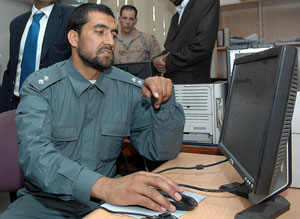Pay By Cell Phone Program Implemented To Reduce Corruption In Afghanistan

An Afghan National Police officer demonstrates the proper procedure for sending messages via cell phone text messaging to inform an Afghan Policeman that his monthly salary is ready. (Photo by Staff Sgt. Jeff Nevison, U.S, Air Force)
Currently, it is difficult for an Afghan National Police officer working in a remote or high risk part of Afghanistan to receive his or her paycheck. The payment process is very manual and this has led to corruption where police pay is being lost.
To help resolve this issue, the Ministry of Interior and the Ministry of Finance, working together with NATO have implemented a new pay by cell phone program in which police officers will get paid electronically. According to a press released issue by NATO today, “under the program, police register to become mobile money customers – a service similar to Western Union – offered by an Afghan cell phone company. Their payroll is electronically transferred to a commercial bank account, and once uploaded; the customer receives an automated text notification on their cell phone. From there the police member can either withdraw their pay at a local authorized mobile money agent using their unique PIN, or transfer the money to a family member’s phone. They can also buy airtime for their phones or pay bills electronically.”
Â
The press release further stated that “after a nine month trial period, where 53 ANP [Afghan National Police] were successfully paid at the beginning of the monthly pay period, MoI [Ministry of Interior] is expanding the program to three additional districts in Wardak and Khost provinces. May was the first month for the new police officers to receive their paycheck electronically; with their addition to the program, a total of 204 police are being paid via their cell phones.”
Â
This program is really good news for police officers serving in places with no banking facilities, and it minimizes corruption. The government hopes to roll this program out to other districts and perhaps all over in Afghanistan.
 May 3, 2010
·
May 3, 2010
·  admin ·
admin ·  No Comments
No Comments
 Posted in: Afghanistan's Economy, Reconstruction and Development, Security in Afghanistan
Posted in: Afghanistan's Economy, Reconstruction and Development, Security in Afghanistan

 May 3, 2010
·
May 3, 2010
·  admin ·
admin ·  No Comments
No Comments  Posted in: Afghanistan's Economy, Reconstruction and Development, Security in Afghanistan
Posted in: Afghanistan's Economy, Reconstruction and Development, Security in Afghanistan





Leave a Reply
You must be logged in to post a comment.